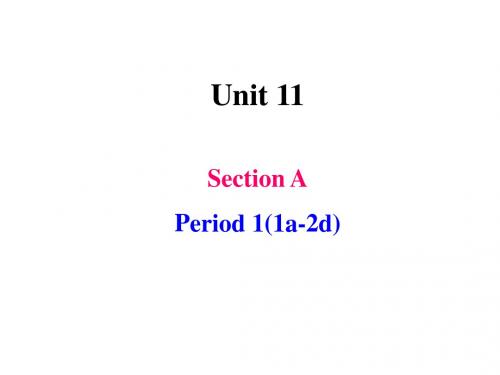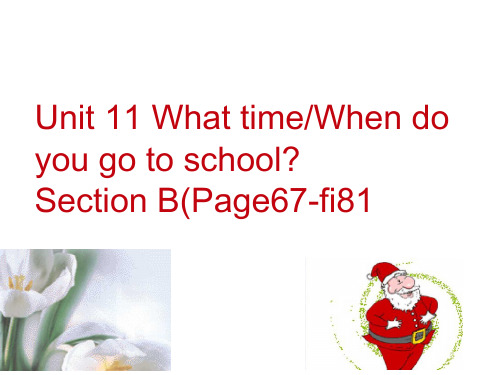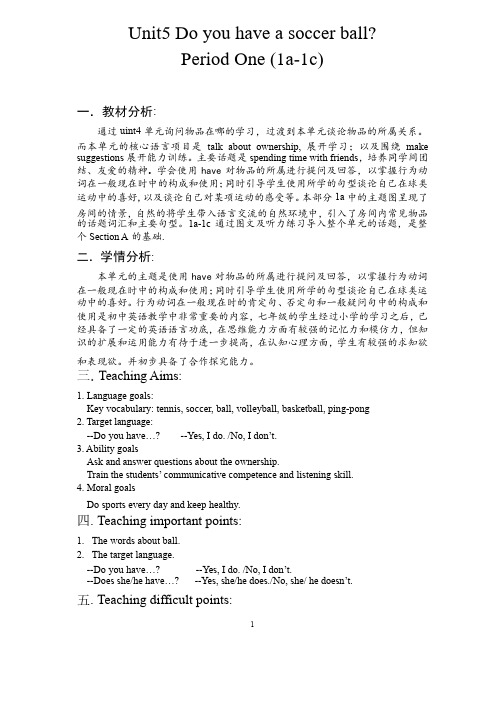新目标英语七年级上unit11_period_1__课件新
- 格式:ppt
- 大小:4.48 MB
- 文档页数:29


Unit 11 What time/When do you go to school?Section B(Page67-fi81eat dinnereat breakfastdo homeworkgo to bedSection B. 1a.When do people usually …?People usually do homeworkeat breakfast?In the morningn the afternoonIn the eveningeat dinner2a:Listen and circle the activities you hear.(p68 answers©)■run■get up■eat dinner■eat breakfast ■eat lunch do my homework take a showergo to schoolgo to bedgo home2a:Listen and circle the activities you hear.(p68 answers©)(^rup) cijat dinnB>^eat breakfas ■ eat lunch dojiiyjTomey^ take_a^hower dgo to^choc Cao to be3)ain and fill in the chart(p68)■ 1 ・get up^5:ooam■2.ru n■3. eat breakfast “ogm■ 4.go to school <<8:00am5. go home •:・4:15呵do homework •:・5:30Dmdinner • 7:15pm o to bed<<9:00pm:conversationInterviewer: Thanks for the interview. Rick ・ We want to know about your day? Rick: OK.Interviewer: When do you get up?Rick: When do I get up? Hmm, Usually around five o5clock・ Then I run aroundInt r: You run at six in the(大约moRick: Breakfast? Usually around seven. And then I usually go to school around eight o'clock ・Interviewer: Wow! And you go home at...? Rick: Four-fifteen in the afternoon?Interviewer: And what do you do in the evening? Rick: I do my homework around five thirty. And I eat dinner at seven fifteen. And I go to bed at nine o'clock.Interviewer: Thafs early! But then you get up early.Rink・llh-huhshe does at these times(完成书本上的练习p69)■ Dear Mona,Thanks for your letter. Do you want to know about my morning? Well, I usually get up at around six-fifteen・ I do my homework at six-thirty, and then I eat breakfast at around seven -thirty. At around eight o'clock, I go to school.School starts at nine o'clock ・Please write and tell me about your morning・LoveJane3b: complete the letter from Tom to his friend, Jiang Min.Dear Jiang Min,Do you want to know about my morning? Well, I usually _______ a tAt around _____ I ______ 5 then Iat ■ I go to school at ■ Please write soon(马上,立刻).Best wishes(最好的祝愿),Tom3a: Read the passage ・ Then match the pictures with the correct clocks.(p67)■Words and expressions®(单词和短语)■work ⑴动词“工作”(2)名词”工作”(不可数)job 名词”工作”(可数)■brush one's teeth 刷牙■have / take a shower 淋浴■get to…到达…;■get home/here/ there 到家/到这里/到那里3a: Keaa tne passage ・ Then match the pictures with the correct clocks.(book P67)■重点句型:■ 1 ・ What a funny time to eat dinner it is! 感叹句:(1)What an interesting book this is!(2)How interesting the book is !2. To get to work, he takes the number 17bus to the Saite Hotel.■take ....bus坐/乘…公车■ Saite Hotel赛特宾馆根据所给词的适当形式填空.1 ・ Do you often take a shower(洗澡))home?2. Why am I the last one? Becaus園为)l am the oldest.3.Which hotel (酒店)would you like to live in?4 Kate washes (洗)her face at 7:00am・5. Who is the first (第一)one to get to the school?6. The students often do their(他们的)homework after school.1 •我弟弟总是晚上九点钟睡觉.My brother usually goes to bed at nine o J clock in the evening.2•你通常什么时候回家?When do you usually go home?3 •早饭后,他弹钢琴.After breakfast, he plays the piano.4 •他经常什么时候洗澡?What time/ When does he take a shower. 5.他上课不听老师讲.He doesn't listen to the teacher.。


1 Unit5 Do you have a soccer ball?Period One (1a-1c)一.教材分析:通过uint4单元询问物品在哪的学习,过渡到本单元谈论物品的所属关系。
而本单元的核心语言项目是talk about ownership, 展开学习;以及围绕make suggestions 展开能力训练。
展开能力训练。
主要话题是主要话题是spending time with friends ,培养同学间团结、友爱的精神。
学会使用have 对物品的所属进行提问及回答,以掌握行为动词在一般现在时中的构成和使用;同时引导学生使用所学的句型谈论自己在球类运动中的喜好运动中的喜好,,以及谈论自己对某项运动的感受等。
本部分1a 中的主题图呈现了房间的情景,自然的将学生带入语言交流的自然环境中,引入了房间内常见物品的话题词汇和主要句型。
1a-1c 通过图文及听力练习导入整个单元的话题,是整个Section A 的基础.二.学情分析:本单元的主题是使用have 对物品的所属进行提问及回答,以掌握行为动词在一般现在时中的构成和使用;同时引导学生使用所学的句型谈论自己在球类运动中的喜好。
行为动词在一般现在时的肯定句、否定句和一般疑问句中的构成和使用是初中英语教学中非常重要的内容,七年级的学生经过小学的学习之后,已经具备了一定的英语语言功底,在思维能力方面有较强的记忆力和模仿力,但知识的扩展和运用能力有待于进一步提高,在认知心理方面,学生有较强的求知欲和表现欲。
并初步具备了合作探究能力。
三. Teaching Aims:1. Language goals:Key vocabulary: tennis, soccer, ball, volleyball, basketball, ping-pong2. Target language:----Do you have…? Do you have…?----Yes, I do. /No, I don’t.Yes, I do. /No, I don’t. 3. Ability goalsAsk and answer questions about the ownership.Train the students’ communicative competence and listening skill.4. Moral goalsDo sports every day and keep healthy.四.Teaching important points: 1. The words about ball.2. The target language.----Do you have…? Do you have…? ----Yes, I do. /No, I don’t.Yes, I do. /No, I don’t. ----Does she/he have…? Does she/he have…?----Yes, she/he does./No, she/ he doesn’t.Yes, she/he does./No, she/ he doesn’t. 五.Teaching difficult points:1. Have 与has 的使用的使用2. Do 与does 开头的一般疑问句开头的一般疑问句六.教法与学法:看图认读读单词法,模仿跟读、情境交际,合作交流等方法让学生掌握一些生活学习用品。


新目标英七年级上册Unit 11 What time do you go to school?教学设计Section A (The First Period)教材依据人民教育出版社义务教育课程标准实验教科书新目标英语《Go for it》第十一单元Section A。
教学内容本课围绕学生最为熟悉的日常作息习惯为话题,通过句型:What time is it? What time do you usually get up? 练习时间的表达和询问方式,同时逐步培养学生合理安排时间的能力。
以谈论日常作息时间安排为主线,将日常生活中所涉及到的语言、词汇和时间的表达法融入到一系列的小任务中,学生通过完成一个个的任务达到交际的目的,从而能够合理安排自己的作息时间;且初步了解时差。
以任务型语言教学为基础,充分体现“以学生为中心”的教学思想。
在教学中,坚持“以学生为主体,以任务教学为主线,以教学为主导,以学生的能力培养为重点,逐步培养学生自主学习的能力”的教学策略。
本课的教学设计本着新目标的理念,针对学生的实际及教学实际来实施。
教学设计教学目标语言目标(1) 询问时间(整点、一刻钟、半点)What time is it? It’s eleven o’clock.(2) what time引导的特殊疑问句What time do you go to school? I go to school at 7:00.What time does he eat breakfast? He eats breakfast at 6:30.(3) 表示频率的副词often, sometimes, usually….能力目标练习时间的表达和询问方式,训练学生的听、说、读、写能力,培养学生合理安排时间的能力。
情感目标培养学生的学习兴趣,让学生养成一个良好的时间使用和安排习惯。
德育目标让学生懂得合理安排时间的重要性和必要性,养成良好的生活习惯。
七年级英语Unit 11 What do you think of game shows?人教新目标版【本讲教育信息】一. 教学内容:Unit 11 What do you think of game shows?二. 教学过程:(一)交际用语本单元的主要交际目标是询问别人看法、表达自己的看法、反问他人的看法和对别人观点的态度,我们分类来看一下:1. 询问别人看法,主要是通过以下的问句实现What do you think of ...?How do you like ...?Do you like ...?2. 表达自己的看法,即对上面问句的回答,包括肯定、否定和中性的回答。
(1)肯定回答:I love / like it. 我喜欢。
It’s cool / nice / beautiful / exciting ...(2)否定回答:I can’t stand it. 我受不了这样的……I don’t like it. 我不喜欢。
It’s terrible / awful 可怕的……(3)中性的回答:I don’t mind. 我不在乎。
(没什么特殊的想法)3. 反过来问他人的看法How / What about you? 你呢?/你怎么看?4. 表达对别人观点的态度I agree with you. 我同意你的看法。
I don’t agree with you. 我不同意你的看法。
I do, too. 我也是……I don’t, either. 我也不……(二)疑难解析Section A1. What do you think of soap operas? 你觉得肥皂剧怎么样?(1)What do you think of ...? 用来询问你对某人或某事的看法、态度等,译为“你认为/觉得某物/某人怎么样?”相当于How do you like ...?肯定回答常用:I love it. / I like it. / It’s cool. 我喜欢/很酷。